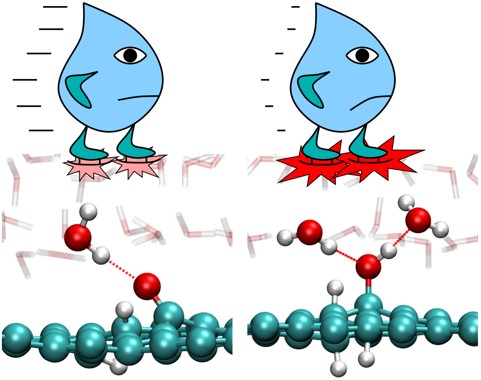
Nanofluidics: beware defects!
Laurent Joly and Samy Merabia (team MMCI) published with colleagues from London an article entitled «Strong coupling between nanofluidic transport and interfacial chemistry: how defect reactivity controls liquid-solid friction through hydrogen bonding» in The Journal of Physical Chemistry Letters.
 Defects are always present in nanofluidic systems such as membranes used for water treatment and sustainable energy harvesting. Yet, their influence on the performance of these systems remains poorly understood. Here, the authors investigated the friction of water on defective surfaces, using ab initio molecular simulations, taking into account the quantum nature of the liquid/solid interface. The simulations show that water dissociates at certain defects, and that these “reactive” defects have a strong influence on friction. Moreover, friction is extremely sensitive to the chemical structure of reactive defects and to the number of hydrogen bonds they can partake in with the liquid. Overall this work shows the crucial role of surface chemistry on the performances of real world nanofluidic systems.
Defects are always present in nanofluidic systems such as membranes used for water treatment and sustainable energy harvesting. Yet, their influence on the performance of these systems remains poorly understood. Here, the authors investigated the friction of water on defective surfaces, using ab initio molecular simulations, taking into account the quantum nature of the liquid/solid interface. The simulations show that water dissociates at certain defects, and that these “reactive” defects have a strong influence on friction. Moreover, friction is extremely sensitive to the chemical structure of reactive defects and to the number of hydrogen bonds they can partake in with the liquid. Overall this work shows the crucial role of surface chemistry on the performances of real world nanofluidic systems.


















